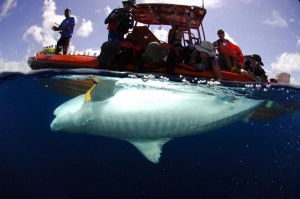Study Initiated After Spike in Shark Attacks in Hawaii
With Hawai`i beach-goers perturbed by a series of shark attacks in island waters, the state’s Department of Land and Natural Resources announced yesterday it will undertake a study to examine the movement of sharks in Hawaiian waters.
But, DLNR officials warn against jumping to conclusions.
In a statement released to the media yesterday, DLNR Chairperson William Aila remarked, “DLNR is paying close attention to the recent series of shark incidents statewide,” adding, “These appear to be random events involving sharks of different species and different sizes. There’s nothing we can yet discern that connects the incidents or provides any sort of explanation.”
Aila explained that shark attack incidents vary in frequency year to year, with most years seeing no attacks or just a single attack. But, the chairman noted, that average has climbed to three or four incidents per year. What raises eyebrows at DLNR, Aila says, is the fact that “we’ve now seen an unprecedented spike.”
In 2013, so far there have been eight shark incidents – four on Maui, three on the Big Island (including the recent shark attack on at 16-year-old) and one on Oahu.
In 2012, there were 10 confirmed, unprovoked shark incidents, the highest number ever recorded. Six of last year’s 10 incidents occurred on Maui, and prompted the DLNR to solicit University of Hawai`i researchers to undertake a study of the problem.
Starting in September, Dr. Carl Meyer of UH will begin a two year study of shark movements. The effort, which is expected to cost $186,000, will help to determine if any changes need to be made in ocean management.
The DLNR has noted that Hawai`i is not alone in its unprecedented run-ins between sharks and humans. In recent years, West Australia, Reunion Island, Egypt, Brazil, and other locations have seen increased shark incident activity, many of them fatal.
In some cases, human behavior has been to blame, and in others no particular cause has been found, explained Aila.
The DLNR is reminding Hawai`i ocean-enthusiasts and tourists to follow a set of recommendations it has developed to help people lower their risk of being attacked by sharks:
- Swim, surf or dive with other people, and don’t move too far away from assistance.
- Stay out of the water at dawn, dusk and night, when some species of sharks may move inshore to feed. But realize that sharks, especially tiger sharks, have been known to bite people any time of the day or night.
- Do not enter the water if you have open wounds or are bleeding in any way. Sharks can detect blood and body fluids in extremely small concentrations.
- Avoid murky waters, harbor entrances and areas near stream mouths (especially after heavy rains), channels or steep drop-offs. These types of waters are known to be frequented by sharks.
- Do not wear high-contrast clothing or shiny jewelry. Sharks see contrast very well.
- Refrain from excessive splashing; keep pets, which swim erratically, out of the water. Sharks are known to be attracted to such activity.
- Do not enter the water if sharks are known to be present. Leave the water quickly and calmly if one is sighted. Do not provoke or harass a shark, even a small one.
- If fish or turtles start to behave erratically, leave the water. Avoid swimming near dolphins, as they are prey for some large sharks.
- Remove speared fish from the water or tow them a safe distance behind you. Do not swim near people fishing or spear fishing. Stay away from dead animals in the water.
- Swim or surf at beaches patrolled by lifeguards and follow their advice.














